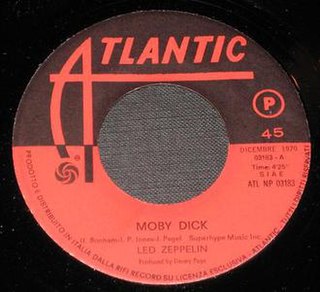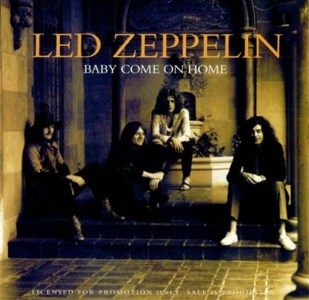
"Misty Mountain Hop" is a song by English rock band Led Zeppelin, released in 1971 by Atlantic Records. The song appears on the band's untitled fourth album, and was released as the B-side to the single "Black Dog" and performed in most of the band's 1972 and 1973 concert tours. In 2019, Rolling Stone ranked the song number 10 on its list of the 40 greatest Led Zeppelin songs.

"Black Dog" is a song by English rock band Led Zeppelin. It is the first track on the band's untitled fourth album (1971), which has become one of the best-selling albums of all time. The lyrics contain typical bluesman themes of lust, eroticism and betrayal. The song was released as a single and reached the charts in many countries. It is "one of the most instantly recognisable Zeppelin tracks", and was included in Rolling Stone's 500 Greatest Songs of All Time list (US), and ranked No. 1 in Q magazine's (UK) "20 Greatest Guitar Tracks".

"Whole Lotta Love" is a song by the English rock band Led Zeppelin. It is the opening track on the band's second album, Led Zeppelin II, and was released as a single in 1969 in several countries; as with other Led Zeppelin songs, no single was released in the United Kingdom. In the United States, it became their first hit and was certified gold. Parts of the song's lyrics were adapted from Willie Dixon's "You Need Love", recorded by Muddy Waters in 1962; originally uncredited to Dixon, a lawsuit in 1985 was settled with a payment to Dixon and credit on subsequent releases.

"Rock and Roll" is a song by English rock band Led Zeppelin, released as the second track on their fourth studio album in 1971. The song contains a guest performance by original Rolling Stones' pianist and co-founder Ian Stewart. In 1972, American music critic and journalist Robert Christgau called it "simply the most dynamic hard-rock song in the music."

"Moby Dick" is an instrumental drum solo by English rock band Led Zeppelin, featured on the band's 1969 album Led Zeppelin II. Named after the 1851 novel of the same name by Herman Melville, it was also known by the alternative titles "Pat's Delight" and "Over the Top" during various points of the band's career. The track is often regarded as one of the greatest drum solos of all time.

"Trampled Under Foot" is a song by English rock group Led Zeppelin. A funk-influenced piece with John Paul Jones on clavinet, it was included on their 1975 album Physical Graffiti. The song was released as a single in several countries and was frequently performed in concert.
"Since I've Been Loving You" is a song by the English rock band Led Zeppelin, released in 1970 on the album Led Zeppelin III.

"Hey, Hey, What Can I Do" is a song by the English rock band Led Zeppelin, released in 1970 as the B-side of the single "Immigrant Song" in the US.

"The Ocean" is a song by English rock band Led Zeppelin, from their 1973 album Houses of the Holy. The ocean is a metaphor for the "sea of heads" faced by lead singer Robert Plant "in the auditoriums", according to the group's biographer Dave Lewis.
"What Is and What Should Never Be" is a song by English rock band Led Zeppelin. It was written by Jimmy Page and Robert Plant and was included as the second track on Led Zeppelin II (1969).

"Immigrant Song" is a song by the English rock band Led Zeppelin. It is built upon a repeating riff and features lyrical references to Norse mythology, with singer Robert Plant's howling vocals mentioning war-making and Valhalla. The song was included on their 1970 album, Led Zeppelin III and released as a single. Several live recordings have also been issued on various Led Zeppelin albums. Other artists have recorded renditions of the song or performed it live.

"D'yer Mak'er" ( "Jamaica") is a song by the English rock band Led Zeppelin, from their 1973 album Houses of the Holy. The title is a play on the words "did you make her?" being pronounced as "Jamaica" when spoken in an English accent.

"Communication Breakdown" is a song by the English rock band Led Zeppelin, from their 1969 self-titled debut album. It was also used as the B-side of the group's first single in the US, "Good Times Bad Times". A promotional video was released, with the group miming to the recording, which is included on the Led Zeppelin DVD (2003).

"Dancing Days" is a song by English rock band Led Zeppelin. It appears on their 1973 album, Houses of the Holy, and was released as a single in the US. It was recorded at Stargroves, England in 1972. It was inspired by an Indian tune that Jimmy Page and Robert Plant heard while traveling in Bombay. This was the first track from the album to be offered for radio play by Atlantic Records. It was premiered on 24 March 1973 on the BBC Radio One Rosko lunch time show.

"Fool in the Rain" is the third song on Led Zeppelin's 1979 album In Through the Out Door. It was the last single released in the US before they formally disbanded in 1980. The song reached number 21 on the Billboard Hot 100 on 16 February 1980.
"The Wanton Song" is a song by English rock band Led Zeppelin from their sixth studio album, 1975's Physical Graffiti. It was developed from a jam session during rehearsals.

"Candy Store Rock" is a song by English rock band Led Zeppelin, released in 1976 on their album Presence. It was also released as a single in the United States, but it did not chart.

"Baby Come On Home" is a soul song by English rock band Led Zeppelin. It was recorded during sessions for the band's debut album but remained unreleased until 1993, when it was included on the compilation Boxed Set 2. The song was also included as a bonus track on some CD editions of the band's ninth studio album Coda as included in The Complete Studio Recordings (1993) and Definitive Collection Mini LP Replica CD Boxset (2008). In 2015, the song was included on disc one of the two companion discs of the reissue of Coda.

"Over the Hills and Far Away" is the third track from English rock band Led Zeppelin's 1973 album Houses of the Holy. In the US, it was released as a single, with "Dancing Days" as the B-side.

"Good Times Bad Times" is a song by the English rock band Led Zeppelin, featured as the opening track on their 1969 debut album Led Zeppelin. The song was Led Zeppelin's first single released in the US, where it reached the Billboard Hot 100 chart.













